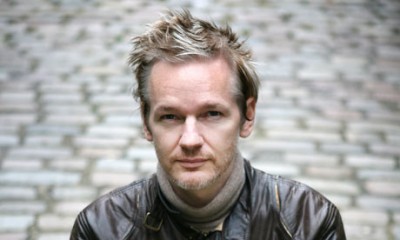Trump, the Department of Justice (DOJ) and Julian Assange

“I’m glad that the Justice Department has found a way to go after Assange. He’s gotten a free ride for too long.” –Rep. Peter King (R-New York), Apr 20, 2017
There had been some doubts from initial enthusiasts about WikiLeaks once information from leaks released on its site started puncturing holes in an already worn Democratic campaign in 2016. Accusations of being an agent of Russian interests were being fired by various officials across the Clinton spectrum, though many Republicans, seeing the Clinton ship holed, preferred reticence, and even praise.
No better example is the current director of the Central Intelligence Agency, Mike Pompeo, recently in the front line of exempting WikiLeaks from free speech immunities.
“Julian Assange,” Pompeo opined emphatically, “has no First Amendment freedoms. He’s sitting in an Embassy in London. He’s not a US citizen.”
The Pompeo of now, his patriotic skin rebadged and dry cleaned from the campaign, claims it “time to call out WikiLeaks for what it really is – a non-state hostile intelligence service often abetted by state actors like Russia”.
During the presidential campaign, Pompeo was rather thrilled to also avail himself of the trove of documents obtained from hacks of the Democratic National Committee. Tweets followed on the “proof” that the DNC had a strategy of fixing the candidate selection process.
But wearing the fake news hat in a new administration has seen Pompeo retreat from such statements, issuing not so much a clarification as a blanket denial that he ever considered WikiLeaks a credible source.[1] The world of post-truths is an expansive one to hide in.
As for the President himself, WikiLeaks was an exciting boon, a sabre to be rattled and directed at his opponents with searing campaign effect.
“WikiLeaks catches Crooked in the act – again,” tweeted Donald Trump last October.[2]
He also declared his love for the organisation and its exploits, noting in January how Julian Assange had essentially exposed the adolescent standard of cyber security fronted by the Democrats.
“Julian Assange said ‘a 14 year old could have hacked Podesta’ – why was DNC so careless?”[3]
All of this places the latest moves behind the Department of Justice investigation of WikiLeaks and Assange in sharp, if contradictory context. Having assumed the mantle of president, Trump is remaining traditional to old concepts of imperial power. Staying mum about operations against North Korea, for instance, is one such example. His restraint regarding that matter on Twitter was not so much superhuman as abnormally deafening. The open information trove drawn upon with such relish is now proving to be a hazard, a liability to be distanced from.
On Thursday, CNN reported that the investigation against Assange, having gone a touch cold during the latter part of the Obama administration since being started in 2010, had been reignited. The obvious point about the reluctance on the part of President Obama’s Attorney General, Eric Holder, was that throwing the prosecutor’s book at Assange would also entail targeting more conventional outlets such as the New York Times and the Washington Post.
Assange himself has made the point that WikiLeaks simply advances the agenda of such outlets, supplementing their missions with material in the conventional tradition of leaks, albeit with greater panache.[4] What matters is the material disclosed “irrespective of whether sources came by that truth legally or have the right to release to the media.”
This point was certainly alluded to in Chelsea Manning’s trial. Of the 22 counts leveled at Manning for disclosing classified material to WikiLeaks, that of “aiding the enemy” was not accepted by the military judge presiding, Colonel Denise Lind.[5] To have done so would have drawn in the news establishment, including mainstream outlets, rendering the fourth estate a confirmed enemy.
Legal counsel for Assange, Barry Pollack, has attempted to dampen the latest spike of interest in WikiLeaks a touch by suggesting that there has been “no communication with the Department of Justice and they have not indicated to me that they have brought any charges against Mr. Assange.”
But Pollack is also clear that much of this is to do with the fact that the DOJ has simply refused to engage in any discussions with the organisation, let alone its legal representatives, about where Assange stands at this point of time. It lacks, as yet, a tweeting fiend to give that game away.
Trump’s current Attorney General, Jeff Sessions, has been clearer. At a Thursday press conference, Sessions seemed to suggest that the administration had every desire to cast a lasso around the information activist, and those in the “leaking” trade.
“We are going to step up our effort and already stepping up our efforts on all leaks. This is a matter that’s gone beyond anything I’m aware of.”
For Sessions, the security environment has become one of anarchic, dysfunctional gloom, riddled with breaches. Notwithstanding the profiting of the Trump campaign from that every same environment,
“We have professionals that have been in the security business of the United States for many years that are shocked by the number of leaks and some of them are quite serious.”
Serious maybe, but only for the person in power at the time.
A final remark by Trump is apt here, if for no other reason than indicating, rather appropriately, the role of the WikiLeaks information machine. The defence may well choose to cite it should Assange ever be surrendered, or rendered and tried by US authorities:
“The dishonest media likes saying I am in Agreement with Julian Assange – wrong. I simply state what he states, it is for the people”.[6]
Dr. Binoy Kampmark was a Commonwealth Scholar at Selwyn College, Cambridge. He lectures at RMIT University, Melbourne. Email: [email protected]
Notes

